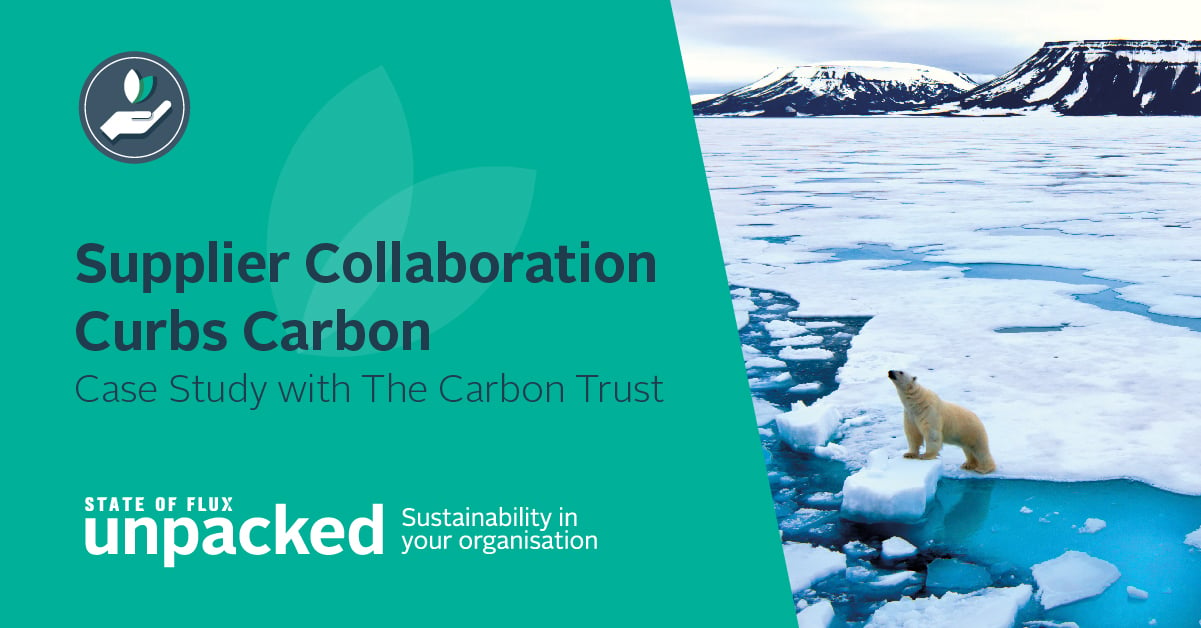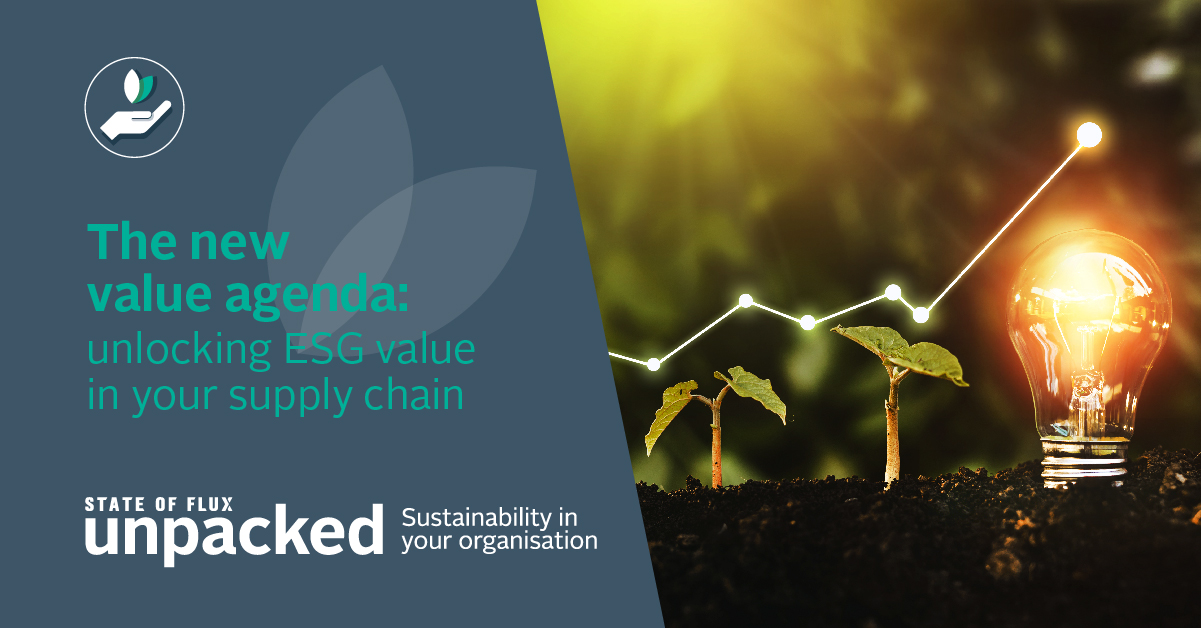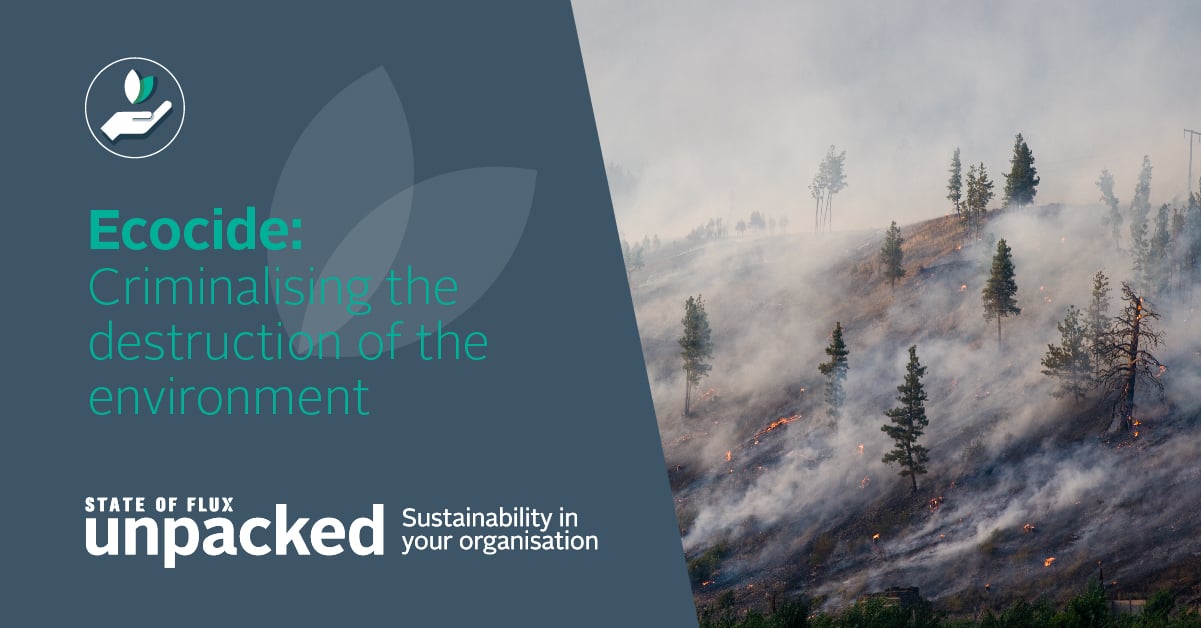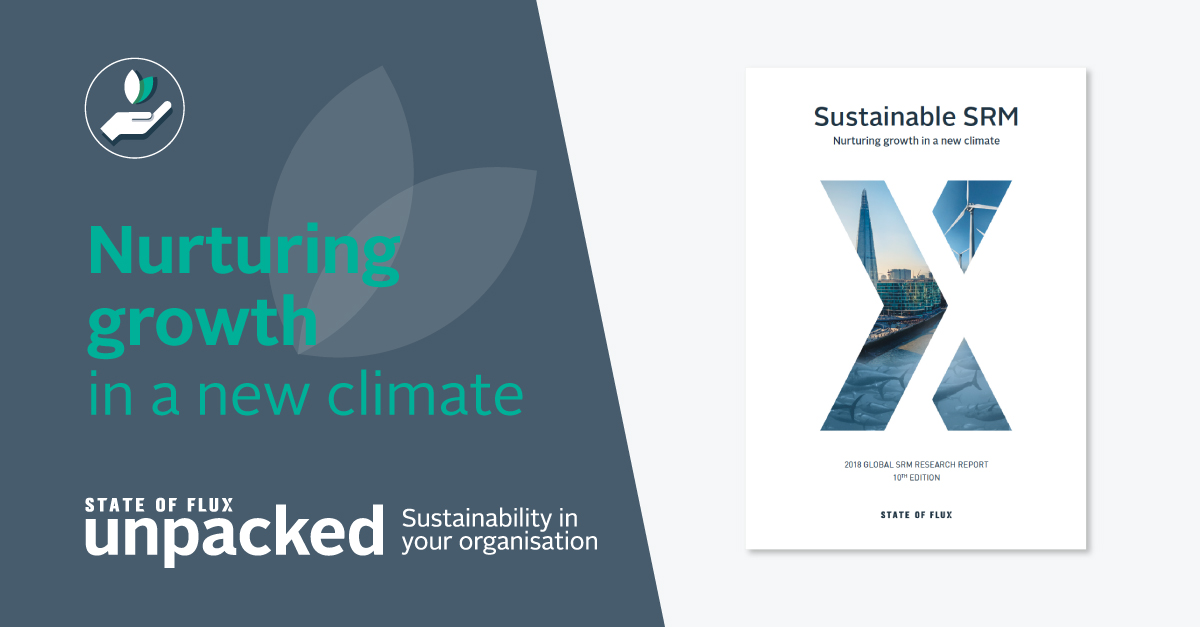HOW ARE SUSTAINABILITY REGULATIONS IMPACTING OUR SUPPLY CHAINS?
Jurisdictions around the world continue to enact legislation containing sustainability provisions that apply to organisations of all sizes, with even more on the horizon. In turn, this is having an impact on global supply chains with a renewed focus on ensuring compliance and visibility. Having effective strategies to understand and implement the legislation throughout your supply chain is crucial in order to mitigate the risks it poses to your organisation.
Typically, legislation relating to sustainability is made up of domestic and internationally-derived laws and regulations, most of which are not singly isolated to a sustainability focus. Within the UK, for example, there is no single overarching piece of sustainability legislation or regulation. Instead there are a number of primary and secondary pieces of legislation, some of which are provided below:
|
Legislation |
Sustainability Provisions |
|
The UK Corporate Governance Code 2018 outlines that a board must establish effective governance framework and ensure that company’s values, strategies and purpose are aligned to their corporate’s culture and workforce policies and contribute wider benefits to society. |
|
|
Set within the Companies Act 2006, the director must align their strategies to develop strong business relationships with suppliers, consumers and other relevant stakeholder. The strategies must also consider the impact the company’s operation will have on the environment and community. |
|
|
The Listing Rules, Disclosure Guidance and Transparency Rules |
Under The Listing Rules, Disclosure Guidance and Transparency Rules companies must disclose actions taken to manage climate-related risks and opportunities and these must be consistent with TCDF framework. |
|
The UK Stewardship code outlines that signatories must apply the principles contained in the code with the consideration on the impact on the environment alongside social impacts. This includes climate change, diversity, remuneration, and workforce issues. |
|
|
The Large and Medium sized Companies and Groups Regulations 2008 |
The Large and Medium sized Companies and Groups Regulations 2008 outlines that companies that fit under this standard must disclose their greenhouse gas emissions alongside their annual energy use and any other relevant information. |
|
The Climate Change Act 2008 sets out that the UK must reduce its greenhouse gas emissions by 80 per cent by 2050. It outlines the necessary framework and legally binding carbon budgeting requirements to help the UK meet this target. |
|
|
The Modern Slavery Act 2015 details that companies must publish a statement on their website detailing action they have taken to combat modern slavery and human trafficking. There are a wide range of suggestions provided to meet this statement requirement. The statement must reflect action taken over the past financial year on their supply chain and business. |
The example legislation provided is a UK example only; organisations who operate globally will need to comply with further legislation contained in the countries they are operating in which only adds to the complexity. This fragmented landscape, with a wide range of laws and regulations for all businesses to be aware of, can be difficult to keep track of, and thus ensure compliance with the legislation, which gives rise to both regulatory and reputational risks. To mitigate this, organisations need to be proactive, have visibility of their supply chains and push for consistency in legislation whether it be at a governmental level or industry wide.

Ecocide: environmental destruction
Explore how inaction is not an option as the world attempts to fight the ever increasing environmental disasters.
Get ahead of the curve
It is imperative that companies pre-empt incoming environmental and social regulations now to be ahead of the curve. It is no longer sufficient to only focus on your own organisation’s sustainability impact, but rather the focus needs to be on the impact that’s taking place within your entire supply chain. In most industries, emissions are derived from our supply chains rather than direct operations. It is therefore key to start having visibility over your supply chain and sustainability impacts to meet incoming regulations and work in collaboration with your supply chain. The ability to track and measure these impacts will enable the implementation of sound sustainability initiatives and be a key part of sourcing and procuring goods in the future. If organisations have a framework in place to do this, they will save both time and resources (financial and non-financial) in the future when further sustainability requirements are implemented.
"It is no longer sufficient to only focus on your own organisation’s sustainability impact, but rather the focus needs to be on the impact that’s taking place within your entire supply chain."
Ensure you have visibility of your supply chain
Disclosure requirements are a key part of sustainability legislation and for many companies with substantial supply chains around the globe, supply chain relationships contribute significantly to sustainability impacts, goals, and public claims. As a result, these companies should have visibility of sustainability data from their own supply chain, and their supplier’s supply chain in order to ensure compliance and obtain a complete view of their holistic activities.

The focus on sustainability data also will lead to greater enforcement risks as regulators, such as the SEC (U.S. Securities and Exchange Commission), increase scrutiny of the accuracy of sustainability disclosures. Increased regulatory oversight will continue to elevate the importance of effective supply chain sustainability-related assessments through robust and responsible sourcing programs. Given that statements regarding sustainability often take the form of public relations and marketing pieces, companies should be mindful not to oversell or overstate the facts regarding their sustainability-related conduct, or fail to disclose any meaningful deterioration of sustainability metrics they have previously chosen to adopt. Appropriate processes to vet and ensure the validity of sustainability reporting, as well as a legal review of such reports and associated public statements, are critical to mitigating regulatory and reputational risk.
Standardised frameworks can make a difference
In addition to legal compliance mechanisms, sustainability governance within private companies has also emerged as a distinct driver of supply chain management. For example, some large retailers require their suppliers to meet specific sustainability metrics to address human rights and social sustainability issues, among others, by using their own sets of standards and conducting supplier audits. Furthermore, corporate industry groups set supply chain standards that go beyond the applicable legal requirements in sustainability areas such as ESG (Environmental, Social and Governance). An example of this is the CFA Institute who have a set of “Global ESG Disclosure Standards for Investment Products” which aim to addresses current gaps in regulation and help harmonise disclosure practices in different markets. Disclosures include how ESG information is used in the stewardship of activities, the type of ESG information used and the risks associated with the use of the ESG information.
"sustainability governance within private companies has also emerged as a distinct driver of supply chain management"
Initiatives from industry groups whose members manufacture high energy driven products, e.g. cement, steel, aviation, chemicals and aluminium, are looking at how to decarbonise those products. One of those ways is to look at the way steel is produced and to shift to greener methods of production, such as using green hydrogen instead of coal, which can reduce emissions by up to 21%. Currently it is more expensive to produce steel in this way however with government support and industry buy in, cleaner steel can become common place in the next decade or so.

A wealth of evidence from academia, government bodies, and activist groups suggests that the existing, isolated approach lacks effectiveness. With the absence of enforcement mechanisms, voluntary initiatives are not always followed, particularly where there is a lack of alignment between financial and sustainability drivers. The fragmentation of existing frameworks creates inconsistencies across industries, causing confusion about what constitutes best practice due diligence and how processes should be implemented. There is a clear need for binding cross-sectoral legislation to create a single, legal standard of care.
Where next?
Organisations that implement sustainability changes in their supply chains, including those that strive to meet or exceed industry sustainability standards in order to win business, receive greater economic benefits.
Organisations should establish and implement a due diligence strategy to identify and assess in an ongoing manner whether their operations cause, contribute to or are directly linked to any potential or actual adverse impacts on human rights, the environment or good governance1. As part of the due diligence strategy, organisations should identify sustainability risks specific to particular countries, sectors, and products to inform their development of ethical sourcing strategies.
"Organisations that implement sustainability changes in their supply chains (...) receive greater economic benefits."
Whilst it may not be possible for companies to monitor and supervise every action carried out by every individual within their organisation, they can (and should) implement comprehensive policies and corporate governance structures whilst staying abreast of legal and regulatory developments that may pose more stringent disclosure requirements or other actions.
Having visibility of your supply chain should be a key element of your supplier management strategy to ensure you have the data to be able to report on sustainability activity and minimise regulatory and reputational risks. Without this, your organisation will fall behind and lose out on the competitive advantage a robust sustainability strategy brings. If you implement changes now, you’ll be in a much more advantageous place than your competitors as you can start to reap the benefits of a more sustainable supply chain whilst being prepared for future legislative changes.
State of Flux are experts in supplier management and can help you work more effectively on managing sustainability in your supply chain. Our experts will work with your organisation to carry out a diagnostic on your sustainability activities to understand the current state and help develop engaging and implementing initiatives throughout your supply chain.
If you would like to work more collaboratively with your supply chain around sustainability, get in touch to find out how State of Flux can help.
References:

AUTHOR - Jake Booth (Manager Consultant)
Jake has a strong background in indirect strategic sourcing with a track record of delivering tangible savings and benefits to support organisations looking to improve their P&L position, excellent stakeholder and project management skills, experience of using and improving P2P systems.
DON'T STOP THERE...WE HAVE MORE CONTENT FOR YOU
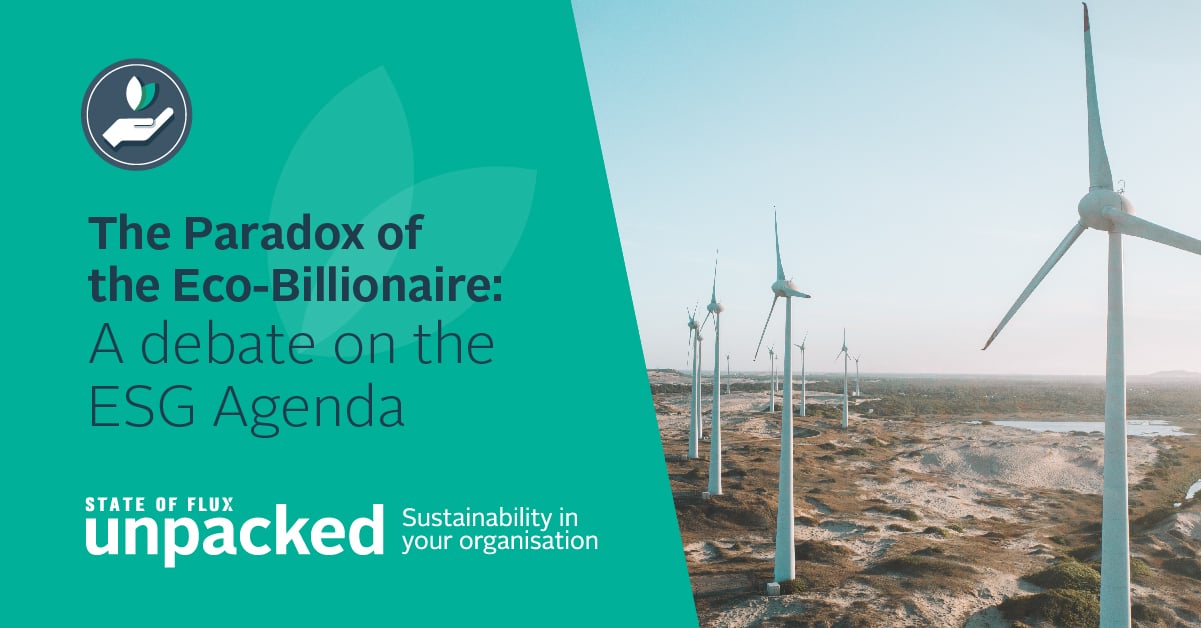
The Eco-Billionaire
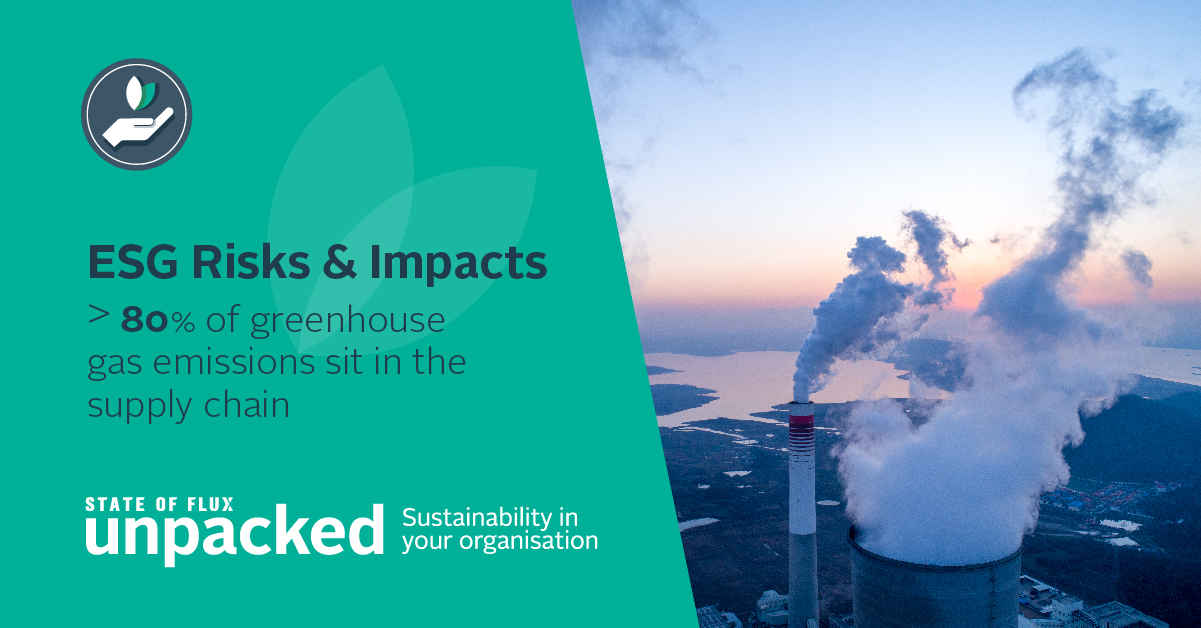
ESG Risks & Impacts
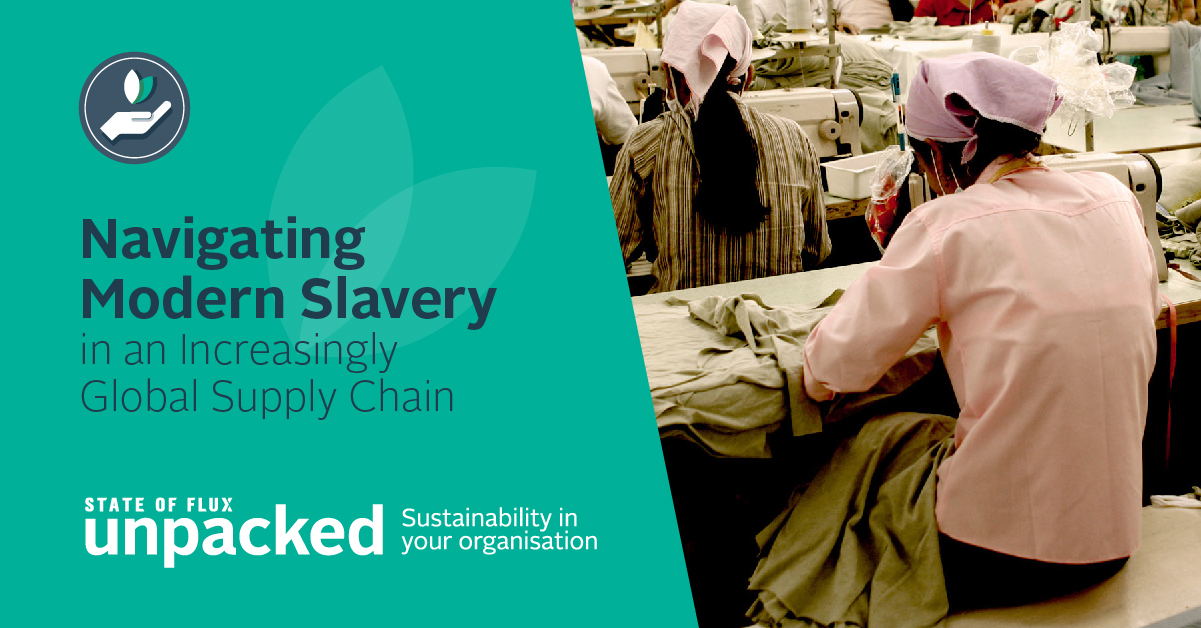
Navigating Modern Slavery in the supply chain
